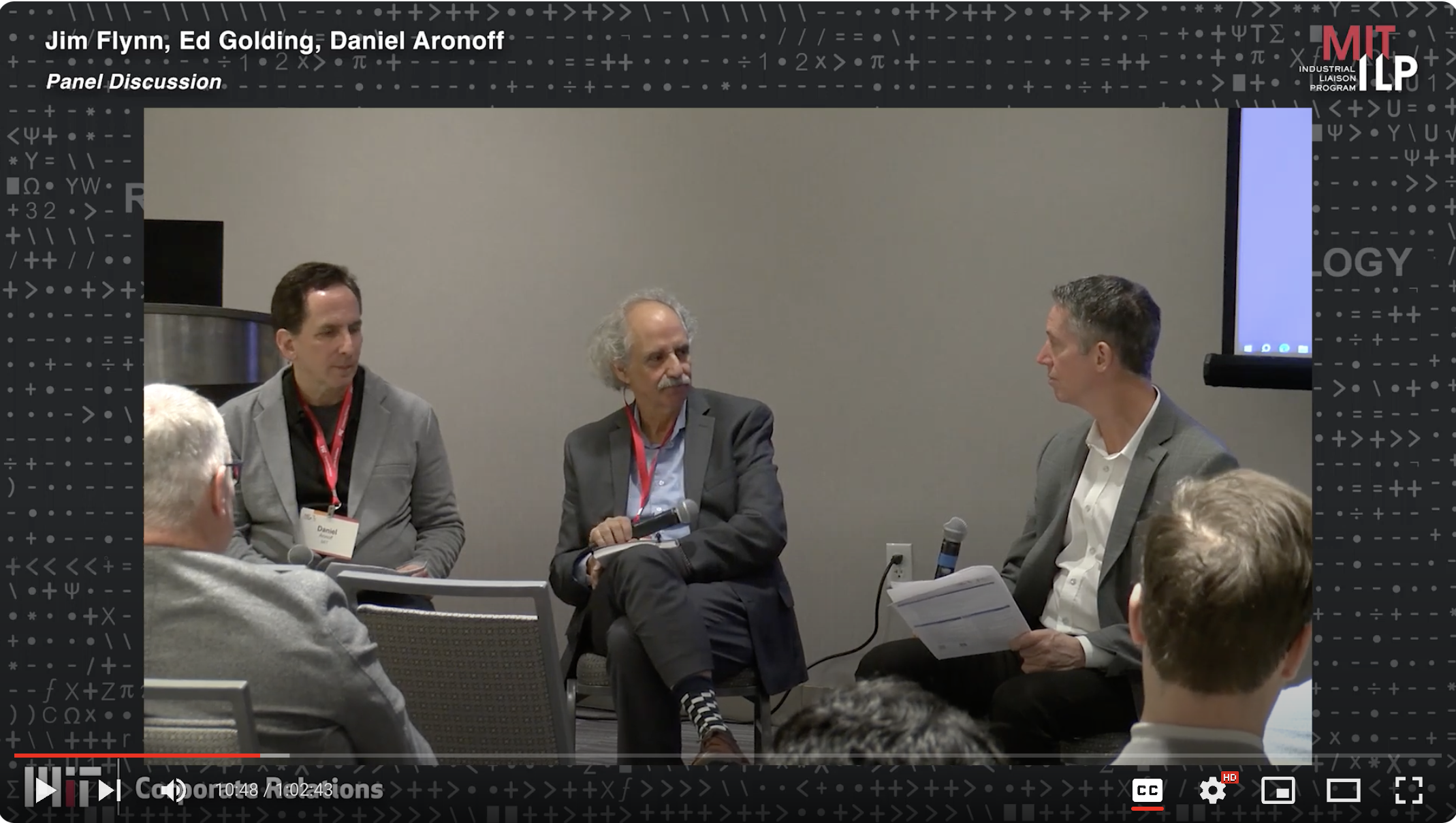In November, MIT Digital Currency Initiative research scientist Daniel Aronoff participated in a panel discussion along with Ed Golding, Executive Director of the MIT Golub Center for Finance, on fintech and the digitization of finance at the MIT Research and Development Conference. The lively conversation touched on many topics relevant to DCI’s work, including safeguarding privacy in central bank digital currencies, decentralizing repo markets through smart contracts, and the future of cash.
Read MoreMIT DCI research scientist Daniel Aronoff shared his work on US Treasury repo markets on two occasions this fall. He spoke on the “Repo on chain and collateral mobilization” panel at the 2023 Rates & Repo North America, and participated in the NBER Market Design Working Group Meeting. You can find information about his ongoing research on this topic here, and watch a video of the panel below.
Read MoreIn October, former central banker Chris Calabia of MIT’s Digital Currency Initiative (MIT DCI) gave a talk at The Institute of International & European Affairs titled “Towards a Central Bank Digital Currency? One View from the United States.”
In this, the second of the IIEA’s mini-series of webinars on the subject of central bank digital currencies (CBDCs), Chris Calabia, Head of CBDC Programs at the Massachusetts Institute of Technology (MIT) Digital Currency Initiative, shares recent research on the opportunities and challenges presented by the potential introduction of a CBDC like a ‘digital dollar’. Mr. Calabia addresses practical and policy questions that this digital asset could raise for our economies and societies, including whether CBDCs could promote greater financial inclusion and how to safeguard privacy while mitigating other risks like fraud and money laundering.
Read MoreDCI researcher Reuben Youngblom gave a talk on blockchain ethics at ETHDenver. As blockchain becomes more impactful in the world, our obligation to make sure that we are proceeding in a responsible manner increases. But what does a responsible future look like?
The featured image on this post is by Timothy Actwell and used via a Creative Commons license.
Read MoreOn April 27, DCI director Neha Narula spoke at Consensus 2023 on private and public money and the role of blockchain technology in future digital payment systems.
Read MoreOn April 22-23, the MIT Bitcoin Club hosted the 10th MIT Bitcoin Expo. DCI director Neha Narula gave a keynote speech, Cryptoeconomic Systems managing editor Reuben Youngblom presented a talk titled "The 70 Megaton Gorilla: Addressing the PoW climate narrative," and DCI software engineer Sam Stuewe presented an asynchronous talk titled "Are We CBDC Yet? A Healthy Dose of Skepticism." Sam also mentored participants in the Expo's Hackathon.
Read MoreOn Tuesday, January 17th at the World Economic Forum in Davos, Switzerland, Axios markets reporter Courtenay Brown and MIT Media Lab Digital Currency Initiative director Neha Narula considered the most pressing issues facing cryptocurrency today including how (and if) the industry should be regulated, how governments and financial institutions should interact with the sector, and how investments could be safeguarded. The View from the Top sponsored segment featured Ripple chief executive officer Brad Garlinghouse.
Read MoreView the DCI presentation and fireside chats from the 2021 MIT BItcoin Expo here
Read MoreChamber of Digital Commerce's Perianne Boring and Neha Narula of MIT Media Lab explain central-bank digital currencies and what their emergence means for crypto and fiat money.
Read MoreIntense interest in cryptocurrencies, like bitcoin, and the Covid-19 pandemic have sparked debate among central banks on whether they should issue digital currencies of their own. Advocates argue that central bank digital currencies, or CBDCs, can make cross-border transactions easier, promote financial inclusion, and provide payment system stability. Here's how central bank digital currencies could become the future of digital finance.
Read MoreThere are many models for “money”--account based models and tokenized money dominate many conversations, but other pathways are breaking new ground as well, including new emoney solutions and conceptions of money as an infrastructure or platform that could support new financial applications and innovations. We talk on this panel about what’s likely--and possible.
Speakers - Andres Wolberg-Stok, Head of Strategy, Office of the CTO, Citi; Robert Bench, Assistant Vice President, Federal Reserve Bank of Boston; Patrick Murck (Moderator), Chief Legal Officer, Transparent; Jenny Cieplak (Moderator), Partner, Latham & Watkins LLP; Neha Narula, Director, MIT's Digital Currency Initiative; Dante Disparte, Vice Chair and Head of Policy & Communications, Libra Association
Read MorePlease join the CSIS Economics Program in partnership with the OMFIF Digital Monetary Institute for a virtual webinar. This event will feature keynote remarks from Brent McIntosh, Under Secretary for International Affairs at the U.S. Department of Treasury and Kenji Okamura, Vice Minister of Finance for International Affairs at Japan’s Ministry of Finance to discuss recent digital currency developments and what they could mean for the future of the international financial and monetary systems. The keynote will be followed by an expert panel discussion to address key issues including:
The link between digital currency, cross-border payments infrastructure, and currency usage in the international financial and monetary systems.
Technology that supports digital currency and how it can meet the design requirements, specifically of central bank digital currency.
Opportunities and risks presented by digital currency to commercial banks and established payments providers.
FinTech offers unparalleled opportunities for financial inclusion, on both macro and micro scales. Today, payments are embedded in platforms in ways that will upend traditional commerce; crypto payments are creating new ecosystems of inclusivity between businesses and customers; and central banks are looking at digital currency to address inclusion on a national scale. This panel discussion will run the gamut of these exciting developments.
Read MoreMany DCI Team members presented at the Crypto Economics Security Conference: Unitize Online Event July 6-10th, 2020.
View their presentations here
Read MoreDirector Neha, Software Developer Gert-Jaap, Phd student Daniel M. (Harvard) and recent MIT DCI MEng Graduate James discuss Proof-of-Work; and the Digital Currency Initiative’s recent projects around Proof-of-Work. Including Monitoring Pool Mining (Gert-Jaap), Double Spend Attacks (Daniel M. and Neha) and 51% Attacks (James).
Read MoreThe year is 2021, and the nation is in crisis. North Korea has just tested a missile that will soon be capable of delivering a nuclear warhead to the continental U.S. The move took Washington by surprise as the project was likely funded via a new Chinese digital currency, which allowed North Korea to bypass the global banking system. In response, the National Security Council House has gathered in the White House Situation Room to formulate short- and long-term responses.
“Digital Currency Wars: A National Security Crisis Simulation” unfolded before a packed audience in Kennedy School Forum on Tuesday night. Hosted by the Economic Diplomacy Initiative and co-sponsored by the Belfer Center for Science and International Affairs, the exercise brought together administration veterans, career diplomats, and academics to dramatize a very real prospect — the rise of an encrypted digital currency that would upend the U.S. dollar’s dominance and effectively render ineffective economic sanctions, like those currently applied to North Korea.
Read More“Ten years ago, a mysterious computer programmer invented a new type of money that wasn't backed by any government or kept in any bank. There were no coins or bills, just long strings of letters and numbers stored inside a network of computers that anybody could be a part of by downloading some free software over the Internet. Today that computerized currency, bitcoin, is well-known, though little understood, and bitcoin's popularity has inspired the creation of thousands of other types of digital money, known as "cryptocurrency." Over the last decade, you could have made a five million percent profit by investing in cryptocurrency. Or you could have lost everything. It has been a wild ride, and few people have experienced the highs and lows…” Cooper. A (2019, May 19) Bitcoin’s Wild Ride.
Read MoreIn this episode for Lightning Month, I talk with Tadge Dryja, the co-author of the Lightning Network whitepaper. We discuss the limitations of the lightning network, why Bitcoin might not be for everyone, alternative scaling ideas, fees and inflation.
Read More

















